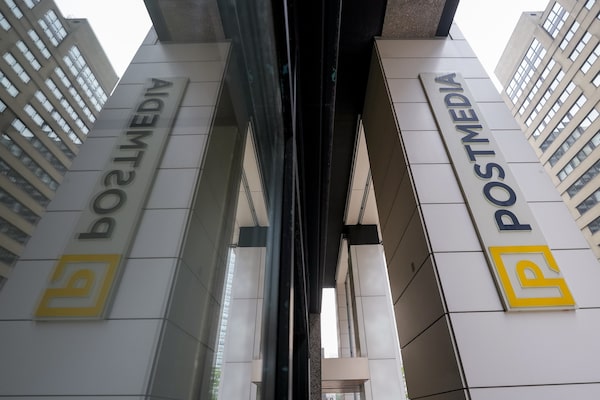
The head office of Postmedia in Toronto, on June 28.Andrew Lahodynskyj/The Canadian Press
One of the country’s largest newspaper owners, Postmedia Network Canada Corp. PNC-A-T, recently paid back its long-time Canadian lender by borrowing more money from a U.S. hedge fund and tapping new American creditors.
Toronto-based Postmedia, which runs 130 newspapers and digital properties, paid down the last of a loan from Richmond Hill, Ont.-based Canso Investment Counsel Ltd. at the end of November, according to a recent news release. The Canso loan, which ranked senior to Postmedia’s other debt, would have come due in 2027. Postmedia and Canso had no comment on the repayment.
Postmedia, one of many domestic media platforms lobbying the Canadian government for financial support, raised the money to pay Canso by borrowing an additional US$14.9-million from Chatham Asset Management LLC, a New Jersey-based fund manager. Chatham is a significant equity investor in Postmedia, and had already loaned the company more than $250-million.
Canso backed Postmedia for over a decade. In 2014, the fund manager bought $140-million of bonds to help finance Postmedia’s purchase of 175 Sun Media newspapers from Quebecor Inc. for $316-million. At that point, Postmedia owed Canso about $240-million.
Over the past decade, Postmedia repaid Canso in part by selling real estate and other assets. The company is focused on paying down debt by increasing traffic to its digital media properties, along with selling traditional print media subscriptions and advertising.
Postmedia is paying Chatham 10.5-per-cent interest on its new bonds, which mature in November, 2028. The rate rises to 11.5 per cent if Postmedia makes interest payments by issuing more bonds to the fund manager, a feature known as payment-in-kind. The company paid 8.5-per-cent interest on the Canso loan.
The company also announced it is working with Chicago-based Eclipse Business Capital LLC on a new three-year, asset-based credit facility that is expected to raise more than US$40-million.
Postmedia said the new loan from Chatham gives the company increased financial flexibility, including a later maturity date and the ability to increase the size of its asset-based loans. It also eliminates the company’s need to maintain a credit rating.
On Wednesday, Moody’s Investors Service stopped rating Postmedia’s debt because it had repaid the Canso debt.
Postmedia has borrowed $253-million from Chatham by issuing notes that pay 10.25-per-cent interest. This debt also has a payment-in-kind option. Last year, Postmedia issued $25.7-million of new notes to make interest payments.
The media company paid a total of $34-million in interest last year, up from $31-million in the previous year, and lost $72.6-million in its 2023 fiscal year, compared with $74.7-million the previous year. Postmedia has about 1,500 employees, and has been through several rounds of layoffs to cut costs.
Earlier this year, Postmedia and Nordstar Capital LP, which owns the Toronto Star, ended discussions about a potential merger, and announced they would not pursue a deal because they were unable to agree on the terms. Sources told The Globe and Mail at the time that concerns at Nordstar about Postmedia’s debt levels were part of the reason the talks broke down.
Chatham owns 63 per cent of Postmedia’s publicly traded shares and controls 31 per cent of its voting rights. The hedge fund has acquired a number of media properties, including the publisher of the National Enquirer in 2014 and U.S. newspaper chain McClatchy Company through a bankruptcy auction in 2020.